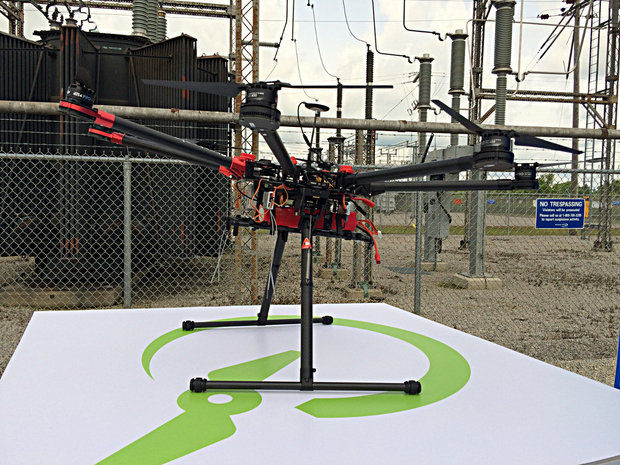Consumers Energy launched an unmanned aerial vehicle (UAV) in Cement City to inspect utility poles and help determine whether the emerging technology can improve customer service.
The remote controlled UAV can transport a 14-pound payload and can be used to inspect utility lines and take thermal and regular video images, Consumers Energy rep Andrew Bordine said.
U.S. Senator Gary Peters, D-Michigan, was on hand during the launch event Monday morning, and said Consumers Energy has the opportunity “to be a big leader” in the use of UAVs for utility line work and review.
“The technology can ultimately mean lower costs for Consumers and then lower rates for people,” he said. “Now it’s a balancing act between the tremendous potential of this technology and privacy and safety concerns.”
Peters serves on the Commerce, Science and Transportation Committee, which oversees the Federal Aviation Administration. Bordine said there were “significant hurdles” to jump in an attempt to make the unmanned aircraft legal under “strict” Federal Aviation Administration standards.
The drone has to fly under 500 feet, he said, which means it can be used to inspect utility windmills as well, which have blades that go up to a maximum of 500 feet in the air.
The drones will be a “huge asset” when inspecting utility lines after storms, said Mary Palkovich, Consumers Energy’s vice president of energy delivery. “We’re in the process of using UAV technology on a limited basis and analyzing if it will help improve energy service delivery,” she said in a prepared statement to the media.
Consumers Energy is the fourth energy company in the country and the first in Michigan to receive FAA approval to test UAVs. The approval allows drone assessing in three Michigan counties: Jackson, Mason and Tuscola.
The drone tested Monday cost roughly $10,000, Bodine said, and the investment will go a long way in saving the utility money.
“Twice a year, we use helicopters to inspect high-voltage power lines, which is expensive,” he said.
The Consumers Energy team charged with developing the drone technology dubbed the program “Quimby,” after Michigan aviation pioneer Harriet Quimby, the first American woman to receive a pilot’s license eight years after the first recorded flight, and the first woman to fly across the English Channel.
Source: M Live

